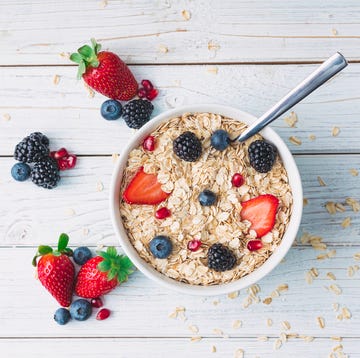Ozempic and other semaglutide medications (including Wegovy and Rybelsus) have changed the lives of millions of Americans with diabetes, obesity and other health issues. Unfortunately, these meds aren't magical cures — they also require lifestyle changes. Semaglutide, which mimics a gut hormone that enables the pancreas to produce insulin when blood sugars spike, also impacts how food interacts with your gastrointestinal tract. For patients prescribed Wegovy in particular, the drug may change the way your body processes meals.
As a result, you need to rethink when and what you eat when you start these medications. Because semaglutide is routinely linked to gastrointestinal (GI) distress, doctors may suggest strategies such as controlling portions and limiting alcohol to avoid these painful and day-ruining side effects.
The good news is you don't need to banish entire food groups. It's more about careful moderation, especially during the first few medication doses. Materials published by Novo Nordisk (the manufacturer of Ozempic and Wegovy) indicate that foods that are high in fat, rich in added sugars or calorie-dense are known to not only potentially worsen side effects, but work against patients who are trying to manage type 2 diabetes and clinical obesity. Read on to learn more about the kinds of dietary changes that may soften Ozempic side effects and other top-level tips from experts.
Editor's note: Weight loss, health and body image are complex subjects — we invite you to gain a broader perspective by reading our exploration into the hazards of diet culture.
When this article was originally published, the author was taking Ozempic as part of his prescribed medical treatment plan for type 2 diabetes. Our reporting has not been influenced by Novo Nordisk or any other pharmaceutical agency. You can read more about his experience here.
Before taking Ozempic
Because Ozempic and other semaglutide medications slow down your gastrointestinal tract — which helps you feel fuller longer, stemming your appetite — nausea and other stomach-related side effects are common. In fact, almost 20% of all people on Ozempic, in particular, experience stomach pain and discomfort at some point, according to materials published by the Food and Drug Administration (FDA). It's why semaglutide is often prescribed in increasing dosages over a longer span of time. Many side effects lessen as the patient increases their dosage and acclimates to the medication.
Doctors advise against some food groups because they delay what's known as gastric emptying. "It varies patient to patient, but fat intake and alcohol intake may prompt or worsen existing nausea, vomiting, heartburn or reflux symptoms because of this," explains Todd Worley, M.D., FACS, an obesity medicine specialist and bariatric surgeon at Houston Methodist Hospital in Texas, who commonly prescribes both Ozempic and Wegovy.
More importantly, patients are asked to minimize processed foods, highly caloric foods, added sugar and alcohol because in addition to potentially worsening GI symptoms, these food groups are known to impact blood sugar. Part of the nutritional counseling that many doctors conduct before prescribing semaglutide focuses on limiting foods that cause blood sugar spikes so the medication can control insulin production better.
Foods to avoid while on Ozempic
Nothing is entirely off limits to those who are on Ozempic or other semaglutide medications, but moderating certain food groups can help you ease side effects and GI symptoms. "In general, patients should avoid added sugar and processed food — or what we may know as 'junk food' — as much as possible," Dr. Worley summarizes.
Minimizing the following foods may help reduce the likelihood of experiencing gastrointestinal side effects, including nausea, vomiting, heartburn and reflux symptoms, according to Dr. Worley.
A special note about alcohol: Because semaglutide slows down digestion, eliminating alcohol or restricting it as much as possible may save you from irritating your stomach. Alcohol is a known irritant to gastrointestinal systems and, when combined with semaglutide, consumption may raise your risk of developing what's known as hypoglycemia, or low blood sugar.
The best foods to eat while taking Ozempic
There isn't one specific "Ozempic diet" that works for all patients, so it's a good idea to meet with a registered dietitian or nutritionist to better understand your nutritional needs. In general, doctors ask patients with type 2 diabetes or clinical obesity to eat foods that are considered low-glycemic, meaning they do not raise or lower blood sugar levels rapidly after they are consumed. Eating these foods alongside low-fat, fiber-rich staples is also less likely to trigger or worsen gastrointestinal distress.
According to the American Diabetes Association (ADA), those with diabetes should lean into low-glycemic foods that are high in protein naturally, packed with gut-friendly fiber and provide healthy fats. Front-loading your diet with fiber-rich foods can also help you feel more satiated for longer during the day. Just keep in mind that introducing new sources of dietary fiber into meals should be done slowly — too much fiber (and fiber supplements) may worsen gas, bloating or constipation.
Along with lowering calorie intakes and controlling portion sizes, eating these foods may be most effective at keeping blood sugars steady:
- Fresh fruits that are considered diabetes-friendly due to sugar content, which includes apples, berries, peaches, pears and more
- Vegetables of all kinds, including fiber-rich leafy greens
- Whole grains and unprocessed starchy sides
- Low- and non-fat dairy products, including yogurt, cottage cheese and milk
- Most meals or foods that are favored in low-fat, low-carbohydrate diets — some popular programs, according to ADA materials, are the Mediterranean diet as well as vegetarian diets
While these general dietary tentpoles are applicable to most, it is crucial that you seek medical advice about your diet and lifestyle from a healthcare provider that is familiar with your in-depth medical history.
Why can't I eat much on Ozempic?
Ozempic and many other semaglutide-based medications suppress your appetite by influencing hormones in your body. They also cause your stomach to process food more slowly, leaving you feeling fuller, longer. All of this translates to many patients feeling less hungry than they've ever felt before, explains Dr. Worley.
Of course, while appetite is indeed minimized for most, it is not fully erased. What's more, some foods may worsen any potential vomiting or diarrhea, while others don't. Other potential side effects of the medications, such as stomach pain, may put a damper on your appetite. Try these tips to lessen those effects:
- Eat smaller amounts more often during the day
- Eat more slowly and chew each bite thoroughly
- Avoid alcohol
- Cut out spicy foods
- Reduce the amount of added sugar you eat to avoid sky-rocketing blood sugar spikes
The bottom line
There isn't a one-size-fits-all diet approach for those on Ozempic, Wegovy or other semaglutide medications currently on the market. Anyone starting a new medication regimen, including semaglutide, must consult their healthcare provider to ensure proper nutritional needs are being met. Doctors often direct their patients to see registered dietitians for this reason, and to address other food habits that may be particularly risky for those with diabetes. Because semaglutide medications have been linked to side effects like nausea, vomiting, diarrhea and constipation, streamlining your diet and avoiding the foods highlighted above may help reduce the likelihood of experiencing these potentially chronic side effects.
Rekha Kumar, M.D. is recognized as an international leader in the field of obesity medicine. She is a practicing endocrinologist in New York City and served as the former medical director of the American Board of Obesity Medicine. Dr. Kumar has lectured internationally on the topic of the medical assessment and treatment of obesity. She has published several papers and textbook chapters in her field and serves as an associate editor of the journal Obesity. She is frequently quoted in the media on topics ranging from the diabetes epidemic in the United States to discussing fad diets, exercise trends, and the complications of Covid-19 in patients with obesity. Dr. Kumar’s areas of expertise include the clinical assessment of patients’ obesity and metabolic syndrome, the effect of obesity on reproductive health and fertility, as well as thyroid disease, and metabolic bone disease.















